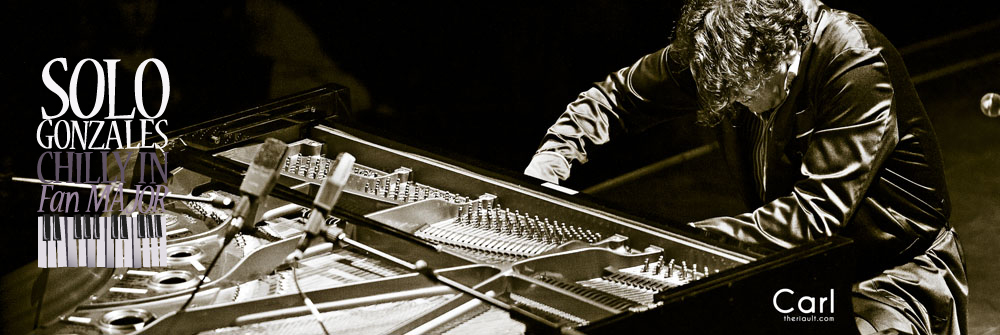When Jian Ghomeshi interviewed Chilly Gonzales for CBC’s Q back in September, the banter covered a wide range of subjects; from recording Solo Piano II to objectivity tests, to reconciling Gonzales’ solo versus producing sides.
Jian Ghomeshi is lauded as one of the great music interviewers on the radio today. A former Canadian-based musician (with moderate success), Jian seems to know just the right questions to ask to elicit really insightful answers from his guests.
Here are a few highlights:
When asked about how stressful the recording process is, Gonzales answers that creating the definitive album version of songs is stressful, in part, because you are trying to imagine what the relationship between every note is, and at the same time, trying to perceive how the listeners will receive the music.
This is an interesting concept. When you listen to (or play) a recorded piece, you inherently hear (and enjoy) the pre-set relationship of the notes to one another. When you compose and record music, it becomes much more apparent that you have to pay attention to exactly what notes are being played when, with what pressure and release characteristics, timing, pedal action, etc. The process becomes much more cerebral, and yet must sound natural and effortless. The final result on Solo Piano II sounds wonderfully effortless!
When asked why he hasn’t further capitalized on the likes of “Never Stop”, Gonzales responds that “Never Stop” was a fluke, so the message is to not be formulaic, but to keep on taking risks and crazy collaborations. The rest will just happen.
This is a great comment for any profession; simply applying what worked yesterday will eventually result in your techniques being outdated and ineffective. By continually improving your output by realistically using the skills you possess, you can greatly heighten the chances that your efforts will pay off. By combining your ideas with others you respect in a collaborative sense, you can learn and grow even faster.
Lastly, when asked if one could hear the Gonzales ‘attitude’ on Solo Piano II, Gonzales responded with a resounding yes! By ‘sampling’ and morphing a classical sample from, say, Ravel, you can say that classical sampling definitely had an influence on the record. At the same time, the songs are structured in a verse-chorus format that has more in common with pop music that classical music. The songs are all played in such a manner that they are ready to be sampled and dropped into a pop song at any moment.
Overall, an insightful interview for not only musicians, but anyone who want to gain insight into Gonzales’ creative process, which contains elements that can be applied to any profession.
